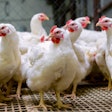On June 11, the American Feed Industry Association (AFIA) joined nearly 1,000 organizations representing the U.S. food and agriculture value chain in calling on members of Congress to swiftly ratify the U.S.-Mexico-Canada Agreement (USMCA).
Coming on the heels of the Trump administration’s submission to Congress of a statement of administrative action (SAA) for the USMCA just after Memorial Day, the clock is now ticking for Congress to take up and ratify the agreement within the next 120 days. In the letter, the organizations reiterated the benefits U.S. agriculture and consumers will reap should this modernized agreement be put in place.
“With Mexico and Canada representing the largest and second largest export markets, respectively, for feed and pet food products and ingredients, we applaud the Trump administration for recognizing the tremendous economic value the modernized USMCA will bring to the country’s 6,200 animal food manufacturers by getting the ball moving on this critical agreement,” said AFIA’s President and CEO Joel G. Newman. “We have a draft trade agreement that we can be proud of, one that benefits all of North America, and we urge our nation’s leaders to make this their number one legislative priority over the summer.”
Since implementation of the former North American free trade agreement, the tariff-free access the U.S. has enjoyed with the two countries has allowed U.S. animal food exports to triple, growing from roughly $669 million in 1993 to over $3.2 billion today. AFIA has been advocating for a modernized free trade agreement that preserves this duty-free market access; enhances biotechnology standards; establishes modern, science-based sanitary and phytosanitary issues; implements science-based regulations and regulatory cooperation and coherence; and addresses the United States’ concerns over Canada’s feed registration requirements, which has unfairly disadvantaged the U.S. animal food industry.

















